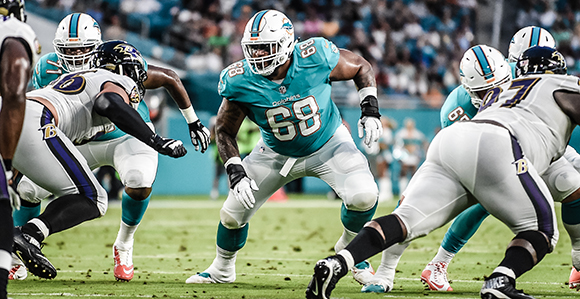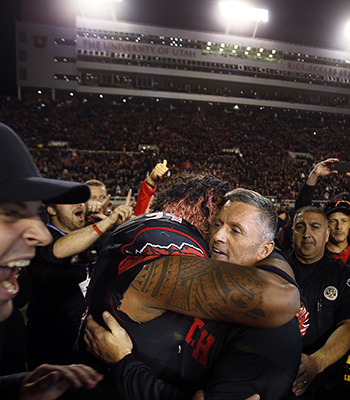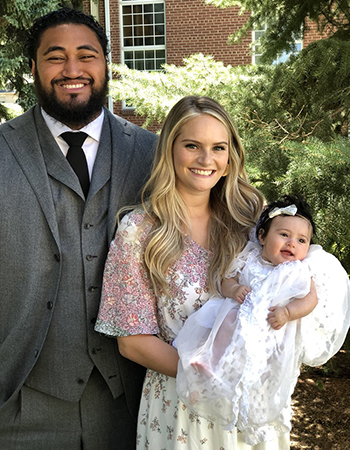“I'm Ready to Go Back”: An NFL Player’s Return to the Temple
Contributed By Jason Swensen, Church News associate editor

Returned missionary Isaac Asiata, who was drafted by the Miami Dolphins in 2017, lines up against the Baltimore Ravens at Hard Rock Stadium in Florida on August 17, 2017.
Article Highlights
- Isaac Asiata felt like an outcast after coming home early from his mission.
- His mom, wife, teammates, and coaches helped him come back to church.
- Lessons from his mission still help him as a husband, father, and professional athlete.
“It’s been great to see Isaac progress. … One of the most rewarding parts of my job is to watch a young man develop.” —Kyle Whittingham, football coach
Related Links
Andy Phillips wasn’t alarmed to receive a text a few years ago from his University of Utah football teammate Isaac Asiata.
The two young men had become friends on and off the gridiron. They were part of the team’s field goal unit and often swapped texts. On the field, it was Asiata’s job to protect Phillips from ornery defensive linemen. Phillips’s job was to kick the ball through the uprights. They depended upon each other.
But this text was different: “I’m ready to go back.”
“Go back,” Phillips understood, meant going back to the temple. For Asiata, returning to the temple after a long absence was one of many “come to himself” moments that were necessary for the now-second-year Miami Dolphin. He was seeking a peace that had eluded him since returning home from his mission earlier than planned.
And for Phillips, “It was a special moment that I’ll never forget.” He had watched Isaac push back adversity with an offensive lineman’s ferocity and come out a better man.
Perhaps there were periods in Asiata’s life when he could not have imagined sending such a resolute text. Those five simple words—I’m ready to go back—spoke volumes to where he had been, what he had become, and where he was going.
Taught by his mother
Raised in Spanish Fork, Utah, Asiata grew up surrounded by the Church. An athletic kid like Isaac could chuck a football in any direction and it would likely land within a field goal’s distance from a Latter-day Saint meetinghouse.
But there were still challenges. A single mother, Leitu Tui worked multiple jobs to keep Isaac and his five siblings fed, clothed, and sheltered. But she paid her tithing, said her prayers, and made sure her children were at church on Sundays.
“My mom always reminded us that she was able to do these things because of the Lord,” he said. “She stayed true to the covenants she made in the temple and raised us with those same principles. She was able to do hard things.”
But the family, he said, was never really alone. “We always had great youth leaders … and they’re still a big part of my life. They were priesthood holders that I could look up to.”
Young Isaac excelled in football, earning high school all-state honors and a scholarship to play at the University of Utah. He redshirted the 2011 season and then accepted a mission call to Tulsa, Oklahoma.

Isaac Asiata and head coach Kyle Whittingham of Utah celebrate their win over USC, 24-21 as the University of Utah and University of Southern California play PAC 12 football Saturday, October 25, 2014. Photo by Ravell Call, Deseret News.
After serving almost a year, he returned home to care for an injury. He did not return.
“When I came home early and decided to stay, it was hard for my family and it was hard for my mom. … I felt like I had brought disrespect to our name.”
Others, he said, looked at him differently than when he had left. He felt like an outcast. He hated it.
“I got so fed up with it that I thought, ‘OK, if you guys want to paint me out to be a bad guy, then that’s who I’m going to be.’”
Ministers in shoulder pads
Frustrated and angry, Asiata followed paths running counter to the childhood lessons he had learned from his mother. “I went for a long time doing things that I knew I shouldn’t be doing. I knew they were the wrong choices to make.”
A couple of years passed. He had returned to college, cracked the Utes’ starting lineup, and developed into an elite offensive lineman. And he continued “doing my own thing.”
Then one morning he awoke to a sobering reality. Despite his burgeoning athletic success, he was miserable. For the first time since his mission he picked up his Book of Mormon. His eyes fell upon Alma 41:10: “Behold, I say unto you, wickedness never was happiness.”

Miami Dolphins offensive lineman and returned missionary Isaac Asiata lines up against the Atlanta Falcons in a preseason game on August 10, 2017. Photo by Dave Cross.
“It was kind of a wake-up call,” he said.
Slowly, he started going back to church. He began cutting away, piece-by-piece, things in his life that he knew were wrong. And he was reminded of something he knew all along—he was not alone.
Besides his mother and his family, “I was blessed to have my high school sweetheart, Angel [Benson]—who is now my wife,” he said. “We dated early and we always kind of knew that we wanted to marry each other. … I made a commitment to her that I would change all of the bad aspects of my life because I knew that what I really wanted was to marry her and be with her for time and all eternity.”
He also leaned on the ministering of several coaches and teammates he regarded first as caring priesthood holders. When he visited with Utah coach Kyle Whittingham outside of practice or games, the veteran coach rarely talked football. Instead, Asiata remembers him asking if he was going to church and what was he learning.
Whittingham said his star guard was “pretty down” after returning from his mission. “He was having a hard time,” he told the Church News. “I just tried to be there for support and to try to help him see the big picture.” Better days awaited, Whittingham promised.
Meanwhile, fellow returned missionaries and teammates such as Westlee Tonga and Andy Phillips were “examples of faith.”
A former world-class ski racer, Phillips was a few years older than most of his Utah teammates and became something of a big brother to Asiata. During one fall camp, the hulking lineman asked his kicker for an unexpected favor.
“Isaac said to me, ‘I’ve been experiencing this pain, and I need a blessing.’”

The Asiata family—Isaac, Angel, and baby daughter Norah. Photo courtesy of the Asiata family.
Phillips humbly provided a priesthood blessing—and also invited his friend to Church meetings and to the blessing of his newborn son, Max. He challenged Asiata to “test the Lord” by doing what was right—and then to expect blessings.
Soon the two Utes were preparing to worship together in the temple.
“When I got my temple recommend back I was scared,” said Asiata. “I had been away from the temple for so long, I didn’t really know what to expect. But Andy was great. He helped me have a great experience in the temple.”
Phillips is grateful he could help his friend—but ultimately, he said, it was Asiata who brought about the changes in his life. In July of 2016, Isaac and Angel were married in the Provo City Center Temple. And as promised, the blessings have come.
Last year, the Miami Dolphins drafted Asiata in the fifth round of the NFL draft. Following his rookie season, the Asiatas welcomed a baby daughter named Norah. The gospel anchors their young family.
Asiata began training camp a few days ago for his second season with the Dolphins. His testimony now helps him navigate pro football’s choppy waters.
“My day is entirely different for me when I can say my morning prayer, read my scriptures, say my midday prayer and read my scriptures, and pray with my wife at night,” he said.
The young family has quickly become a welcome addition to their new south Florida congregation. “The Asiatas are wonderful people,” said Hollywood Ward (Fort Lauderdale Florida Stake) Bishop Bradley Bills.
Asiata’s college coach also keeps close tabs on his former player.
“It’s been great to see Isaac progress as he has,” said Whittingham. “He’s in the NFL now and has a great wife and family. One of the most rewarding parts of my job is to watch a young man develop.”
A returned missionary
Asiata’s full-time mission did not end as he had planned. But he’s proud to be called a returned missionary. He learned lessons on his mission that continue to serve him well as a husband, father, and professional athlete.
When he and Angel drove from Utah to Florida prior to his rookie NFL season, they passed through areas where he had once labored in a white shirt and tie. He was overcome by the memories of the good times and the tough times that define missionary service. He visited with people he had taught and baptized and befriended.
“There were so many things that I was able to learn on my mission that helped me when I started going back to church and helped build my testimony,” he said. “I will carry those things with me for the rest of my life.”
He also knows that many people in wards and branches across the world are trying to minister to a young man or a young woman whose mission ended earlier than he or she had planned: “Just tell them, ‘You’re home now. It doesn’t change anything. You are a beautiful son or daughter of our Heavenly Father and He loves you. … Don’t let [the missionary] feel alone. Be supportive. And help them come back if they leave.”
Phillips said he’s not surprised to see his old teammate speak candidly about personal, often painful, moments from his life. “Isaac has a big heart. He understands the impact he can have on those around him.”
